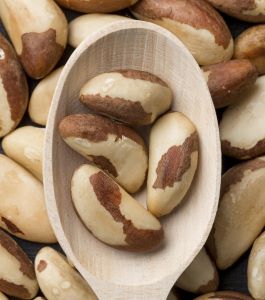Thinking about Selenium
by Reed Mangels, PhD, RD
Selenium is an essential mineral that we need in very small amounts – the RDA is 55 micrograms daily for an adult. To put that in perspective, a microgram is a millionth of a gram. Even though we only require a small amount of selenium, we must meet our needs for it from food and/or supplements in order to stay healthy. Selenium is needed for our thyroid gland to function properly, for DNA production, for reproduction, and for helping to protect our bodies from damage caused by free radicals. The Recommended Dietary Allowance (RDA) for selenium is:
Birth to 6 months: 15 micrograms/day (this is the Adequate Intake rather than the RDA)
7-12 months: 20 micrograms/day (this is the Adequate Intake rather than the RDA)
1-3 years: 20 micrograms/day
4-8 years: 30 micrograms/ day
9-13 years: 40 micrograms/day
14 years and older: 55 micrograms
Pregnancy: 60 micrograms/day
Lactation: 70 micrograms/day
Many whole plant foods can supply us with selenium although the selenium content of foods vary widely, depending, in plant foods, on the amount of selenium in the soil where the plants were grown. In the United States, the effect of variations in soil selenium levels is less than in other countries because we typically eat food grown in different areas, including areas where the soil is rich in selenium. Studies in the United States report both lower selenium intakes (1, 2) and little difference in selenium intake or in selenium status between vegetarian and nonvegetarians (3,4). Experimental diets designed to represent typical vegan diets in the United States were found to provide more than the RDA for selenium (5, 6).
The National Institutes of Health identifies people who eat only local foods grown in soils that are low in selenium as more likely than others to have trouble getting enough selenium (7). If you are vegan and eat only local foods that are grown in soils that are low in selenium, you may need to take a supplement that provides additional selenium.
10 Good Sources of Selenium for Vegans
- Brazil nuts 319 micrograms of selenium in 2 Tablespoons
- Whole wheat pasta, cooked, 25 micrograms of selenium in ½ cup
- Tofu, firm 22 micrograms of selenium in ½ cup
- English muffin, whole grain, 17 micrograms of selenium in 1 muffin
- Whole wheat bread, 9 micrograms of selenium in 1 slice
- Portabella mushrooms, diced, 8 micrograms of selenium in ½ cup
- Vegetarian baked beans, 6.5 micrograms of selenium in ½ cup
- Soybeans, cooked, 6.3 micrograms of selenium in ½ cup
- Oatmeal, cooked, 6 micrograms of selenium in ½ cup
- Brown rice, cooked, 5.6 micrograms of selenium in ½ cup
Note that the amounts of selenium in foods listed above are from the U.S. Department of Agriculture (USDA) nutrient database and may under- or overestimate the actual selenium content of a specific food item (8).
Some Interesting Facts About Selenium
- In China, there are wide differences in soil selenium content in different areas. Because of this variability, the selenium content of corn, rice, and soybeans can vary 1000-fold from one area of China to another (8).
- Animals can conserve selenium when food selenium is low and excrete selenium when their intake is high. Thus, the selenium content of animal products does not vary as much as does the selenium content of plant foods.
- Routinely getting too much selenium (more than 400 micrograms daily in adults) from all sources – food, beverages, and supplements – can result over time in health issues including nausea, diarrhea, garlic breath, rashes, and nervous system problems.
References
- Jin Y, Kanaya AM, Kandula NR, et al. Vegetarian diets are associated with selected cardiometabolic risk factors among middle-older aged South Asians in the United States. J Nutr. 2018;148:1954-1960.
- Lynch HM, Wharton CM, Johnston CS. Cardiorespiratory fitness and peak torque differences between vegetarian and omnivore endurance athletes: A cross-sectional study. Nutrients. 2016;8:726.
- Shultz TD, Leklem JE. Selenium status of vegetarians, nonvegetarians, and hormone-dependent cancer subjects. Am J Clin Nutr. 1983;37:114-118.
- Tesar R, Notelovitz M, Shim E, et al. Axial and peripheral bone density and nutrient intakes of postmenopausal vegetarian and omnivorous women. Am J Clin Nutr. 1992;56:699-704.
- Turner-McGrievy GM, Barnard ND, Scialli AR, Lanou AJ. Effects of a low-fat vegan diet and a Step II diet on macro- and micronutrient intakes in overweight postmenopausal women. Nutrition. 2004;20(9):738-746.
- Hess JM, Comeau ME. Application of dairy-free vegetarian and vegan USDA food pattern models for non-pregnant, non-lactating healthy adults. J Food Sci. 2022;87:4703-4713.
- Office of Dietary Supplements, NIH. Selenium Fact Sheet for Consumers. https://ods.od.nih.gov/factsheets/Selenium-Consumer/. 2021.
- Stoffaneller R, Morse NL. A review of dietary selenium intake and selenium status in Europe and the Middle East. Nutrients. 2015;7:1494-1537.
To read more about selenium see:
Selenium Fact Sheet for Consumers (from National Institutes of Health; contains nonvegan sources of selenium)
The contents of this website and our other publications, including The Vegan Journal, are not intended to provide personal medical advice. Medical advice should be obtained from a qualified health professional. We often depend on product and ingredient information from company statements. It is impossible to be 100% sure about a statement, info can change, people have different views, and mistakes can be made. Please use your best judgment about whether a product is suitable for you. To be sure, do further research or confirmation on your own.

